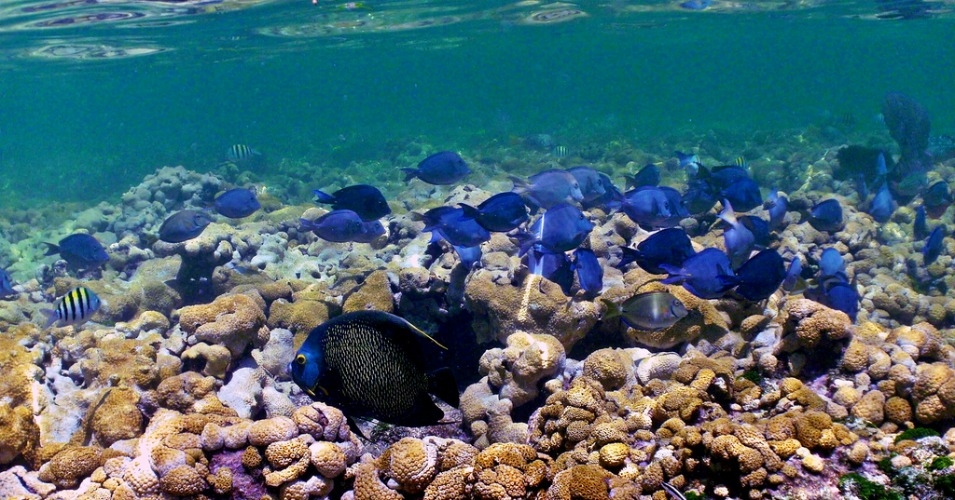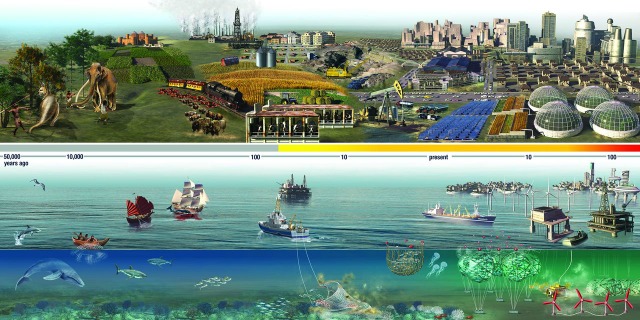But 'proactive intervention' could still avert marine disaster, researchers find
 "Although defaunation has been less severe in the oceans than on land, our effects on marine animals are increasing in pace and impact," the researchers write. (Photo: Phil's 1stPix/flickr/cc)
"Although defaunation has been less severe in the oceans than on land, our effects on marine animals are increasing in pace and impact," the researchers write. (Photo: Phil's 1stPix/flickr/cc)
Jan. 16, 2015 (Common Dreams) -- Marine wildlife at all levels of the food chain has been badly damaged by human activity, says a new report that urges immediate and "meaningful rehabilitation" if we are to avert mass extinction in the world's oceans.
"We may be sitting on a precipice of a major extinction event," Douglas J. McCauley, an ecologist at the University of California, Santa Barbara and an author of the study, told the New York Times.
The report, published Thursday in the journal Science, finds that habitat loss, mismanagement of oceanic resources, climate change, and the overall "footprint of human ocean use" have resulted in a phenomenon known as "defaunation" -- a decline in animal species diversity and abundance.
"Although defaunation has been less severe in the oceans than on land, our effects on marine animals are increasing in pace and impact," reads the study abstract. "Humans have caused few complete extinctions in the sea, but we are responsible for many ecological, commercial, and local extinctions. Despite our late start, humans have already powerfully changed virtually all major marine ecosystems."
"Humans have profoundly decreased the abundance of both large (e.g., whales) and small (e.g., anchovies) marine fauna," it continues. "Such declines can generate waves of ecological change that travel both up and down marine food webs and can alter ocean ecosystem functioning."
Just as the Industrial Revolution during the 1800s decimated the huge tracts of forests, driving many terrestrial species to extinction, industrial use of the oceans threatens to destroy marine habitats and in turn damage the health of marine wildlife populations.
Report co-author Steve Palumbi of Stanford University listed several emerging threats to the oceans: "There are factory farms in the sea and cattle-ranch-style feed lots for tuna. Shrimp farms are eating up mangroves with an appetite akin to that of terrestrial farming, which consumed native prairies and forest. Stakes for seafloor mining claims are being pursued with gold-rush-like fervor, and 300-ton ocean mining machines and 750-foot fishing boats are now rolling off the assembly line to do this work."
 Timeline (log scale) of marine and terrestrial defaunation. If left unmanaged, the authors predict that marine habitat alteration, along with climate change (colored bar: IPCC warming), will exacerbate marine defaunation. (Credit: Science)
Timeline (log scale) of marine and terrestrial defaunation. If left unmanaged, the authors predict that marine habitat alteration, along with climate change (colored bar: IPCC warming), will exacerbate marine defaunation. (Credit: Science)
"Human activities are negatively impacting the ocean at an ever increasing and unsustainable rate, and we must freeze the footprints of industrial activities and commercial fishing," Oceana marine scientist Amanda Keledjian told Common Dreams. "Oceana applauds these researchers for their work, because assessing the oceans from a holistic perspective is the only way to understand the scope at which we must act to reverse collapsing fisheries and continued habitat degradation."
According to the Times:
Scientific assessments of the oceans’ health are dogged by uncertainty: It’s much harder for researchers to judge the well-being of a species living underwater, over thousands of miles, than to track the health of a species on land. And changes that scientists observe in particular ocean ecosystems may not reflect trends across the planet.
Dr. [Malin L.] Pinsky, Dr. McCauley and their colleagues sought a clearer picture of the oceans’ health by pulling together data from an enormous range of sources, from discoveries in the fossil record to statistics on modern container shipping, fish catches and seabed mining. While many of the findings already existed, they had never been juxtaposed in such a way.
A number of experts said the result was a remarkable synthesis, along with a nuanced and encouraging prognosis.
"I see this as a call for action to close the gap between conservation on land and in the sea," said Loren McClenachan of Colby College, who was not involved in the study.
The report authors say the effects of human activity in the ocean are still reversible: "Proactive intervention can avert a marine defaunation disaster of the magnitude observed on land."
Oceana's Keledjian echoed that appeal. "This study reminds us that it is critical to do everything we can to protect vulnerable species and the ocean ecosystems on which they depend," she said. "While much remains unknown about the state of the oceans, we cannot wait to act until we know with 100 percent certainty that extinctions and devastation are upon us, because that will already be far too late."
This work is licensed under a Creative Commons Attribution-Share Alike 3.0 License












